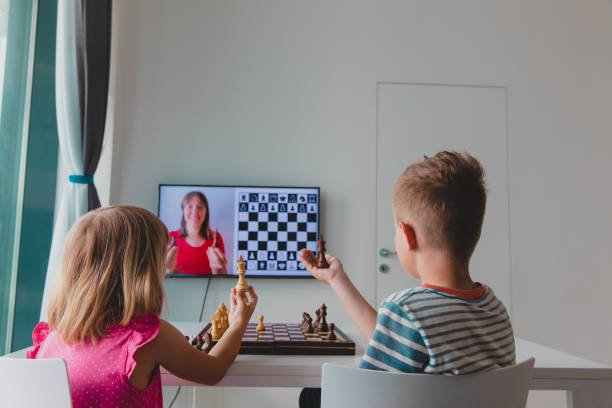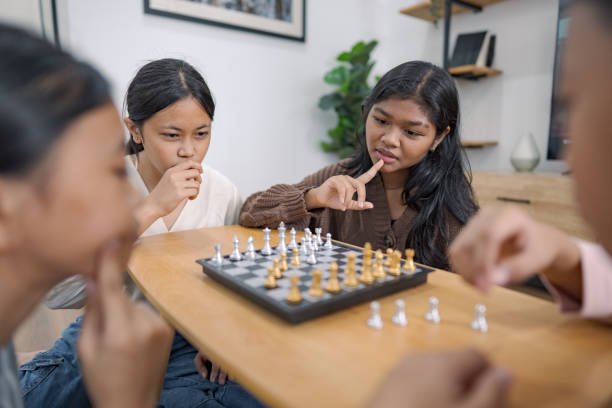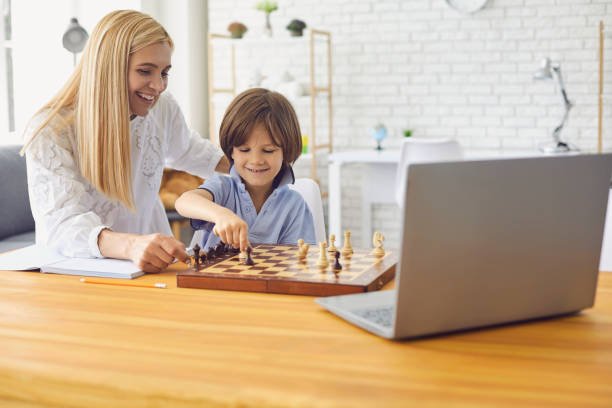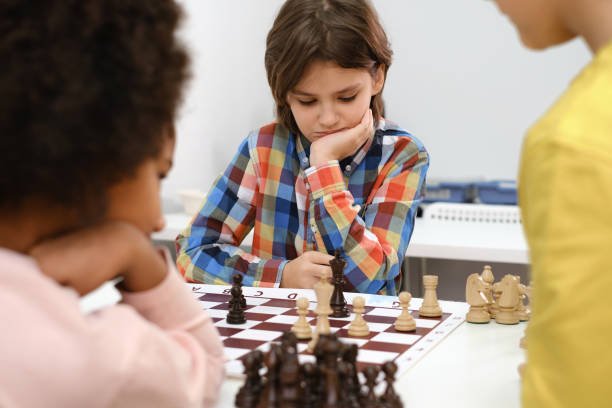If you live in Berlin and want calm, steady chess growth for your child—or for yourself—you are in the right place. This guide is simple and honest. It shows you the best ways to learn chess in Berlin today, and it explains why the right coach and the right plan change everything.
Here is the short truth. Chess is not about memorizing moves. It is about clear thinking. A good coach teaches you to slow down, see danger, and choose with care. A good program gives you small steps and real goals. You stop guessing. You start seeing. Confidence grows. School work gets easier. Emotions feel easier to manage. That is what we do at Debsie every day.
Debsie is an online chess academy with friendly, FIDE-certified coaches. We teach live. We speak in very simple words. We use a clean, step-by-step path so you always know what comes next. Each lesson has one purpose you can name in a sentence. Each week builds on the last. You get short notes after class, so parents can follow along and students can feel proud.
Online Chess Training
Online chess training has changed how people learn. It is simple, flexible, and built for real life. You sit in your home in Berlin, open your laptop, and your coach is there. No U-Bahn ride across the city. No waiting in a noisy club. No rushing after school or work. You learn in comfort, with full attention on your game.
The biggest strength of online chess is structure. Random play or casual club meetings can feel fun, but they don’t always build lasting skill. Real progress comes from a clear path. Online classes at Debsie follow a step-by-step system, like a ladder. You start with basics: safe moves, king safety, and piece teamwork.
Then you add simple checkmate patterns, like the ladder mate and back-rank mate. After that, you learn tactics like forks, pins, and discovered attacks. Later you study openings, endgames, and strategy. Each lesson is small enough to remember, and each builds on the last. This is how skill grows without confusion.
Online tools also make learning sharper. Coaches can highlight squares, draw arrows, and replay moments instantly. You see the idea, not just the move. This makes the game clear. Children especially learn faster this way because their eyes catch patterns quickly when they are shown visually.

Landscape of Chess Training in Berlin and Why Online Chess Training is the Right Choice
Berlin is one of Europe’s great chess cities. It has a rich tradition, famous tournaments, and many active clubs. Walk through neighborhoods like Kreuzberg or Charlottenburg, and you will find chess boards in cafes, clubs in community centers, and players at public squares. The city is alive with the game.
But this busy scene has its challenges. Many clubs focus on team play and tournaments. This is wonderful for competitive players, but for beginners or children just starting, it can feel overwhelming. Classes are often in large groups, sometimes twenty or more. The coach teaches to the whole room, and individual needs can get lost.
A shy child may play an entire game without a coach watching. A beginner may sit through advanced lessons they cannot follow. A stronger player may get bored by basics.
Berlin’s clubs also run on fixed schedules. Maybe Tuesday evenings at 6pm or Saturday afternoons. If your family has schoolwork, sports, or trips, you miss the class. There is no replay, no catch-up. Over time, missed classes mean gaps. Those gaps later show as weak endgames, poor time control, or habits like rushing moves.
Travel is another issue. Berlin is large. Going from Aigelstein to Mitte or from Wedding to Kreuzberg takes time. Parents may spend more energy driving or riding the U-Bahn than the child spends learning. After a long day, that extra effort feels heavy.
Online training solves these issues. With Debsie, lessons fit your schedule. You don’t need to leave home. The coach gives full attention to your child’s thinking, not to a whole room. The lessons follow a clear curriculum, not random topics. You don’t lose classes to traffic or school trips. And you don’t worry about your child sitting quietly in the back of a group, unseen.
How Debsie is The Best Choice When It Comes to Chess Training in Berlin
Debsie is not just a coaching platform. It is a full academy. We have FIDE-certified coaches who know both the game and how to teach it simply. Our system is structured like a school curriculum, but it feels warm, personal, and fun. Every lesson has a goal you can name. Every week builds on the last. You see progress in games and in life skills too.
Our teaching style is human. We don’t flood a child with theory. We don’t lecture. We coach. We ask what they see. We listen. We praise effort. We guide mistakes gently. We show how to think, not just what to play. This builds habits that last: patience, focus, and calm under stress.
We also offer bi-weekly tournaments online. These are safe, guided events where children from Berlin play peers from other countries. They practice time use, handling nerves, and reviewing games. We make sure every child learns something from each game, win or lose. This turns competition from fear into growth.
Parents in Berlin love Debsie because it fits family life. There is no commute across the city. Lessons are on time, every time. Updates after class show progress. Coaches adapt if the child is shy, bold, new, or advanced. Our system works for all ages, from young beginners to adults chasing tournament goals.
Most important, Debsie teaches life skills. Chess is the tool. Focus, patience, smart choices—those are the real outcomes. Parents tell us their children concentrate better on homework, handle emotions better, and feel more confident in daily life. That is why Debsie stands above local clubs and private tutors.
You can see this yourself. Book a free trial now. Sit nearby for the first minutes. Watch your child’s face when a tough idea becomes simple. That smile is why Debsie is first in Berlin. Book here: https://debsie.com/take-a-free-chess-trial-class/

Offline Chess Training
Berlin has a long chess history. Walk through neighborhoods like Kreuzberg or Charlottenburg, and you will see people playing in cafés, parks, and public squares. The city has many active chess clubs, from small neighborhood groups to larger organizations that compete in national leagues. These places give a strong sense of tradition. They connect players of all ages.
In an offline class, you might see twenty students gathered in a room. The coach explains a position on a demo board, while children copy moves on their boards. Afterward, they may play practice games.
The atmosphere is lively, and there is a feeling of community. Children learn not only the moves but also the rituals of chess—shaking hands, respecting the opponent, writing moves on a scoresheet. For some families, this is an important cultural experience.
But let’s be honest about what happens inside those classes. Group sizes are often large. Coaches must divide attention across many students. Beginners may struggle quietly without help. Advanced players may wait while basics are repeated. The pace is set by the group, not the child.
Offline clubs also focus heavily on tournaments. Many encourage children to join team matches early. This can be exciting, but also stressful. A child may lose game after game before they have built the skills to handle it. Without proper support, they may start to dislike the game.
For families in Berlin, travel is another real factor. Even if the club is nearby, getting there after school or work means rushing, packing, and commuting across the city. Berlin is large, and traffic or train delays are common. A one-hour chess class can easily take up three hours of family time. Children arrive tired, parents return home stressed.
Drawbacks of Offline Chess Training
Offline chess training has several key drawbacks that matter if you want lasting progress.
The first drawback is lack of structure. Clubs may cover different topics week to week—openings one day, puzzles another, tournament prep the next. There is rarely a clear roadmap from beginner to advanced. Without a curriculum, children repeat mistakes, forget key ideas, and miss entire areas of the game.
The second drawback is large groups. With many students in a room, the coach cannot watch every move. A child may blunder the same way five times without correction. They may sit silently, unsure what to do. Chess is about the thought process, not just the move. Without hearing a child’s thinking, a coach cannot fix habits.
The third drawback is limited feedback. Parents often ask, “What did you learn today?” and hear, “We played games.” That does not show progress. Without feedback, parents cannot track growth, and children lose motivation. They do not see how far they’ve come, so they stop caring.
The fourth drawback is logistics. In Berlin, moving from one district to another can take time. By the time you reach the club, park, and settle, much of the evening is gone. For children, this means learning while tired. For parents, it means stress and lost hours. Over time, consistency breaks down.
The fifth drawback is early tournament pressure. Clubs often push children into competition quickly, especially when teams need players. Some children enjoy it, but many feel nervous. A string of losses can hurt confidence. Without careful guidance, competition becomes fear instead of growth.
For these reasons, offline training alone often cannot deliver the steady, personal progress families in Berlin want. It works for social play and tradition. But for real skill, structure, and life-skill growth, online training is stronger.

Best Chess Academies in Berlin
Berlin has many chess options. Some are traditional clubs, some are schools, some are private tutors. They all add to the city’s chess culture. But when compared with Debsie, they show limits. Debsie leads because it combines structure, flexibility, and care in a way others cannot.
1. Debsie
Debsie is number one for chess training in Berlin. We are an online academy with FIDE-certified coaches and a structured curriculum. Each lesson has a clear goal. Each week builds on the last. We teach live, in simple words, and we listen to the child’s thinking. We praise effort. We correct habits gently. We make learning safe, warm, and effective.
Your journey starts with a free trial class. The coach greets the student, plays a short game, and observes. Do they rush? Do they freeze? Do they see checks and threats? From this, we design a plan. The plan is personal, short, and clear. Parents see it. Students understand it. Everyone knows the path.
Lessons follow a warm rhythm. We recap last week, teach one new point, apply it in puzzles or games, then close with a win. Parents get a short note after class: what was learned, what was strong, what comes next. This makes progress visible.
Every two weeks, we run safe online tournaments. Students from Berlin play peers worldwide. They practice time use, courage, and game review. Coaches watch, cheer, and guide mistakes kindly. This turns competition into growth, not stress.
Debsie also fits real family life in Berlin. No commuting. No late nights. No missed classes without replay. If a coach is away, another steps in with the same plan. Learning never stalls.
Most of all, we teach life skills through chess. Focus. Patience. Smart choices. Calm under pressure. Parents tell us their children handle homework better, control emotions more, and show new confidence. Chess is the tool. Growth is the result.
Book your free trial today. Watch your child’s face light up when a tough idea becomes simple: https://debsie.com/take-a-free-chess-trial-class/
2. Berliner Schachverband (Berlin Chess Federation)
The Berlin Chess Federation oversees many clubs and tournaments across the city. It is strong in tradition and competition. Families can find local clubs through it and join league events. But lessons are group-based and focused on competition, not personal growth. Structure and flexibility are limited.
3. Schach-Club Kreuzberg
This is one of Berlin’s most famous clubs, with a long history and many strong players. It is a hub for tournaments and team matches. The atmosphere is lively and competitive. But the focus is on events, not on a structured path for individual learners. Beginners may feel lost in the crowd.
4. TSV Mariendorf Chess Section
This club offers regular training sessions and league play. It provides community and team spirit. But classes are still group-based, and progress depends on the pace of the group. Personal coaching and feedback are limited.
5. Private Tutors in Berlin
You can find chess tutors through platforms like Superprof. Some are strong players and offer private lessons. But quality varies. Few provide a long-term curriculum or progress notes. Families must search carefully, and consistency can be an issue.

Why Online Chess Training is The Future
Online chess is the future because it removes the hard parts of learning and keeps only what helps the mind grow. You learn at home in Berlin, in a space that feels safe. You click one link. Your coach appears. The board is clean. The sound is clear. There is no commute, no rush, no waiting room. Energy stays high for the one thing that matters: your thinking.
The future belongs to methods that are simple and steady. Online lessons make this easy. We teach one small idea at a time. We show it with bright arrows and colored squares so the eye understands before the mouth needs big words. We replay the key second of a game and freeze the screen at the moment the plan changed. You see the why behind the move. The brain loves this kind of learning. It sticks.
Online also means personal pacing. Some learners speed up when they feel safe. Some need a quiet pause to speak their thought. In a one-to-one call, the coach can slow down or push forward at the exact right moment.
There is no pressure from a big room. There is no fear of looking silly in front of a crowd. When fear drops, curiosity rises. Curiosity makes practice feel light. Light practice done often beats heavy practice done rarely.
Consistency is another reason the future is online. Berlin is busy. Trains get delayed. Evenings fill up. Weather changes. With online lessons, the class still runs. The rhythm stays. A steady weekly rhythm builds strong habits: look, think, then move; check danger first; make a small plan you can say in one sentence. These habits shape not only games, but also homework and daily choices.
Online tools give coaches a new kind of vision. We can see your time use. We can see where your mouse hovered. We can spot the second you changed your mind and ask, “What did you see here?” That one question shows us the pattern inside your thinking. Then we fix the pattern, not just the move. That is real teaching.
https://debsie.com/take-a-free-chess-trial-class/
How Debsie Leads the Online Chess Training Landscape
Debsie leads because we join heart with order. We hire FIDE-certified coaches who are also patient teachers. We speak in very simple words. We teach tiny steps that stack up. We keep joy safe so effort stays strong. This is not a slogan. It is our daily habit.
After the trial, we write a short plan you can read in a minute. Early lessons train safety, smooth development, and simple mates until your eyes find them without help. We add tactics gently.
We teach openings as ideas, not as long lists. We bring endgames in early, because endgames build calm. We turn them into little races: can you make a queen in five moves with perfect steps? These tiny wins add up. They build real confidence.
Every class follows a warm rhythm. We say hello. We recall one small idea from last time. We learn one new point. We use it in a short puzzle or guided game. We end with a small win and one sentence to carry into the week. This makes the mind feel safe and strong. Safe minds learn faster.
Practice between classes is light by design. Ten minutes a day is enough. One puzzle set, one mini endgame, one model game to click through. Light practice done often beats heavy practice done rarely. We keep it light so you keep doing it.

Conclusion
If you are in Berlin and want a clear, caring path to chess growth, the answer is simple: choose online training with Debsie. Offline clubs have history, tradition, and community.
They are part of the city’s culture. But they also bring group lessons, fixed times, travel across districts, and pressure to compete too soon. Progress is often random, and children can feel lost in the crowd.
Debsie solves these problems. We teach live, online, one step at a time. We start with a real trial lesson, not a sales talk. We listen to your child’s thinking, find one habit to build, and create a short plan that makes sense right away.
Every lesson has a goal you can name. Each week builds on the last. We send parents a simple note after class so progress is always clear.
Every two weeks, we host safe online tournaments where children from Berlin meet peers worldwide, learn to use the clock, and build courage under pressure.
Comparisons With Other Chess Schools:
.



